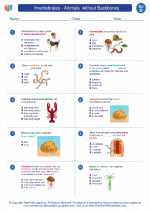Nylon: Explanation and Study Guide
Nylon is a synthetic polymer that was first produced in the 1930s by a team of chemists at DuPont. It is a versatile material that is widely used in various applications due to its strength, durability, and resistance to abrasion.
Properties of Nylon
- Strength: Nylon is known for its high tensile strength, making it suitable for use in products that require durability and resilience.
- Elasticity: Nylon has a high elasticity, allowing it to stretch without breaking and return to its original shape.
- Chemical Resistance: Nylon is resistant to many chemicals, making it suitable for use in industrial and chemical applications.
- Abrasion Resistance: Nylon is highly resistant to abrasion, making it ideal for use in products such as ropes and carpets.
- Heat Resistance: Nylon can withstand high temperatures without melting, making it suitable for use in applications that involve heat and friction.
Uses of Nylon
Nylon is used in a wide range of products and industries, including:
- Textiles: Nylon is commonly used in the production of clothing, including stockings, swimwear, and activewear, due to its strength and elasticity.
- Industrial Applications: Nylon is used in the manufacturing of ropes, conveyor belts, and industrial fabrics due to its high tensile strength and abrasion resistance.
- Automotive Industry: Nylon is used in the production of car parts, such as gears, bearings, and engine components, due to its durability and heat resistance.
- Consumer Goods: Nylon is used in the production of everyday items such as backpacks, luggage, and tents due to its strength and durability.
- Sports Equipment: Nylon is used in the production of sports equipment such as racket strings, fishing lines, and climbing ropes due to its strength and flexibility.
Study Guide
Here are some key points to remember about nylon:
- Nylon is a synthetic polymer with high tensile strength and elasticity.
- It is resistant to abrasion, chemicals, and heat, making it suitable for a wide range of applications.
- Nylon is used in textiles, industrial applications, automotive industry, consumer goods, and sports equipment.
- Its versatility and durability make it a popular choice in various industries.
Remember to review the properties and uses of nylon, and try to identify products in your surroundings that may be made of nylon. Understanding the applications of nylon will help you appreciate its importance in different industries.
Good luck with your studies!
.◂Science Worksheets and Study Guides Fourth Grade. Invertebrates - Animals without Backbones
Study Guide Invertebrates - Animals without Backbones
Invertebrates - Animals without Backbones  Activity Lesson
Activity Lesson Invertebrates - Animals without Backbones
Invertebrates - Animals without Backbones  Worksheet/Answer key
Worksheet/Answer key Invertebrates - Animals without Backbones
Invertebrates - Animals without Backbones  Worksheet/Answer key
Worksheet/Answer key Invertebrates - Animals without Backbones
Invertebrates - Animals without Backbones  Worksheet/Answer key
Worksheet/Answer key Invertebrates - Animals without Backbones
Invertebrates - Animals without Backbones  Worksheet/Answer key
Worksheet/Answer key Invertebrates
Invertebrates  Vocabulary/Answer key
Vocabulary/Answer key Invertebrates - Animals without Backbones
Invertebrates - Animals without Backbones  Vocabulary/Answer key
Vocabulary/Answer key Invertebrates - Animals without Backbones
Invertebrates - Animals without Backbones  Vocabulary/Answer key
Vocabulary/Answer key Invertebrates - Animals without Backbones
Invertebrates - Animals without Backbones  Vocabulary/Answer key
Vocabulary/Answer key Invertebrates - Animals without Backbones
Invertebrates - Animals without Backbones  Vocabulary/Answer key
Vocabulary/Answer key Invertebrates - Animals without Backbones
Invertebrates - Animals without Backbones 

 Activity Lesson
Activity Lesson
 Worksheet/Answer key
Worksheet/Answer key
 Worksheet/Answer key
Worksheet/Answer key
 Worksheet/Answer key
Worksheet/Answer key
 Worksheet/Answer key
Worksheet/Answer key
 Vocabulary/Answer key
Vocabulary/Answer key
 Vocabulary/Answer key
Vocabulary/Answer key
 Vocabulary/Answer key
Vocabulary/Answer key
 Vocabulary/Answer key
Vocabulary/Answer key
 Vocabulary/Answer key
Vocabulary/Answer key

The resources above cover the following skills:
Life Science: The students will use scientific skills and processes to explain the dynamic nature of living things, their interactions, and the results from the interactions that occur over time.
Diversity of Life: Explain how animals and plants can be grouped according to observable features.
Classify a variety of animals and plants according to their observable features and provide reasons for placing them into different groups.